2008 年天津商业大学基础英语考研真题
Part One Vocabulary
Directions: Among the four choices, choose the one that is the best to explain the
given word. (25%)
1. conceivable
A. reasonable B. imaginable C. considerable D. credible
2. sepulchral
A. overwhelmed B. pleasant C. picturesque D. gloomy
3. burnished
A. polish B. smooth and shiny
C. having been burned D. something made of copper
4. girder
A. an I-shaped iron beam B. closely organized association
C. ancient trade union D. a tree trunk
5. distinct
A. distinguish B. distance C. clear D. distract
6. humble
A. hunch B. hump C. respect D. lowly
7. conviction
A. convention B. strong belief
C. the state of being convinced D. certainty
8. count on
A. depend on B. expect C. take into account D. number
9. enlist
A. enroll B. attract C. obtain D. compose
10. onslaught
A. invasion B. aggression C. fierce attack D. annexation
�
11. cataract
A. cataclysm B. horror C. disaster D. flood
12. fortify
A. multiply by forty B. strengthen C. a stronghold D. fortress
13. intervene
A. invade B. aggression C. intermezzo D. interfere
14. horde
A. class B. squad C. company D. throng
15. primordial
A. prim B. moral C. fundamental D. module
16. smart
A. feel distressed B. wisdom C. foe D. folly
17. vestige
A. trace B. vest C. invest D. privilege
18. hectic
A. affluent B. acute C. exciting D. naughty
19. derelict
A. grievous B. deprived C. abandoned D. hunted
20. hummock
A. a desert B. a low rounded hill C. a high mountain D. a plain
21. stow
A. load roughly B. unload carefully C. move quickly D. hide away
22. frenzied
A. full of uncontrolled excitement B. full of happiness
C. depressed D. encouraged
23. desolate
A. isolated B. united C. eccentric D. barren
24. slump
A. rise up B. sink down C. move on D. repeat
25. squash
�
A. invade B. infer C. squeeze D. separate
26. infuriate
A. set apart from other B. fill with rage
C. become fastened D. keep in a certain position
27. inquisitive
A. unnecessarily curious B. seriously urgent
C. completely controlled D. ready made
28. sidle
A. climb secretly B. slide smoothly C. slip fast D. walk sideways
29. nibble
A. eat large pieces B. swallow down C. take small bits D. sip bit by bit
30. ghetto
A. musical instrument B. poor area C. dust D. grave
31. hack
A. cut carefully B. dig roughly C. make slowly D. move smoothly
32. stork
A. green grass B. black soil C. white bird D. small plant
33. garrison
A. railway station B. training centre C. military camp D. battle field
34. hobble
A. walk in difficulty with small steps B. walk quickly with strides
C. walk slowly and lazily D. walk sideways with tips and toes
35. bumpy
A. smooth B. rough C. heavy D. stout
36. witchcraft
A. craftsmanship B. black magic C. airplane D. supervisor
37. nostalgic
A. sensational B. romantic C. homesick D. fashionable
38. stature
A. status B. statue C. station D. statute
�
39. mores
A. customs B. drugs C. adventurousness D. sergeants
40. orgy
A. bombast B. binary C. compatible D. digitized
41. contingent
A. corps B. distinction C. notion D. morality
42. obsolescent
A. unabated B. smug C. outmoded D. sodden
43. obliquely
A. sexually B. reluctantly C. internationally D. indirectly
44. harass
A. plead B. trouble C. scold D. flout
45. fad
A. feature B. imitator C. craze D. pulpit
46. crook
A. cook B. cheat C. cowboy D. writer
47. curb
A. control B. shock C. escape D. drift
48. sterile
A. cynical B. sensitive C. unproductive D. sophisticated
49. illicit
A. legal B. illegal C. resistible D. irresistible
50. aftermath
A. search B. investigation C. experiment D. consequence
Part Two Reading comprehension
Directions:
I. Each of the passage below is followed by some questions. For each question there
are four answers marked [A], [B], [C] and [D]. Read the passage
carefully and choose the best answer to each of the questions. Then mark
your answer on answer sheet. (30%)
�
Passage 1
If you intend using humor in your talk to make people smile, you must know
how to identify shared experiences and problems. Your humor must be relevant to
the audience and should help to show them that you are one of them or that you
understand their situation and are in sympathy with their point of view. Depending
on whom you are addressing, the problems will be different. If you are talking to
a
group of managers, you may refer to the disorganized methods of their secretaries;
alternatively if you are addressing secretaries, you may want to comment on their
disorganized bosses.
Here is an example, which I heard at a nurses' convention, of a story which
works well because the audience all shared the same view of doctors. A man
arrives in heaven and is being shown around by St. Peter. He sees wonderful
accommodations, beautiful gardens, sunny weather, and so on. Everyone is very
peaceful, polite and friendly until, waiting in a line for lunch, the new arrival
is
suddenly pushed aside by a man in a white coat, who rushes to the head of the line,
grabs his food and stomps over to a table by himself. “Who is that?" the new
arrival asked St. Peter. “On, that's God,” came the reply, “but sometimes he thinks
he's a doctor.”
If you are part of the group which you are addressing, you will be in a
position to know the experiences and problems which are common to all of you
and it'll be appropriate for you to make a passing remark about the inedible
canteen food or the chairman's notorious bad taste in ties. With other audiences
you mustn't attempt to cut in with humor as they will resent an outsider making
disparaging remarks about their canteen or their chairman. You will be on safer
ground if you stick to scapegoats like the Post Office or the telephone system.
If you feel awkward being humorous, you must practice so that it becomes
more natural. Include a few casual and apparently off-the-cuff remarks which you
can deliver in a relaxed and unforced manner. Often it's the delivery which causes
�
the audience to smile, so speak slowly and remember that a raised eyebrow or an
unbelieving look may help to show that you are making a light-hearted remark.
Look for the humor. It often comes from the unexpected. A twist on a
familiar quote “if at first you don’t succeed, give up” or a play on words or
on a
situation. Search for exaggeration and understatements. Look at your talk and pick
out a few words or sentences which you can turn about and inject with humor.
1. To make your humor work, you should_______ .
[A] take advantage of different kinds of audience.
[B] make fun of the disorganized people.
[C] address different problems to different people.
[D] show sympathy for your listeners.
2. The joke about doctors implies that, in the eyes of nurses, they are________ .
[A] impolite to new arrivals.
[B] very conscious of their godlike role.
[C] entitled to some privileges.
[D] very busy even during lunch hours.
3. It can be inferred from the text that public services________ .
[A] have benefited many people.
[B] are the focus of public attention.
[C] are an inappropriate subject for humor.
[D] have often been the laughing stock.
4. To achieve the desired result, humorous stories should be delivered_______.
[A] in well-worded language.
[B] as awkwardly as possible.
[C] in exaggerated statements.
[D] as casually as possible.
5. The best title for the text may be_______.
[A] Use Humor Effectively.
[B] Various Kinds of Humor.
�
[C] Add Humor to Speech.
[D] Different Humor Strategies.
Passage Two
Every profession or trade, every art, and every science has its technical vocabulary,
the function of which is partly to designate thing or process which have no names
in ordinary English, and partly to secure greater exactness in nomenclature. Such
special dialects, or jargons, are necessary in technical discussion of any kind.
Beinguniversally understood by the divorce of particular science or art, they have
the precision of
mathematical formula. Besides, they save time, for it is much more economical to
name a process than to describe it. Thousands of this terms are popularly included
in every large dictionary, yet, as a whole, they are rather on the outskirts of
English language than actually within its borders.
Different occupations, however, differ widely in the character of their special
vocabularies. In trades and handicrafts, and other vocations, like farming and
fishery, they have occupied great number of men from remote times, the technical
vocabulary, is very old. It consists largely of native words, or of borrowed words
that have worked themselves into the very fiber of our language. Hence, though
highly technical in many particulars, these vocabularies are more familiar in
sound; and more generally understood, than most other technicalities. The special
dialects of law, medicine, divinity, and philosophy have also, in their old strata,
become pretty familiar to cultivated persons, and have contributed much to the
popular vocabulary. Yet every vocation still possesses a large body of technical
terms that remain essentially foreign, even to educated speech. And the proportion
has been much increased in the last fifty years, particularly in the various
departments of natural and political science and in the mechanic arts. Here new
terms are coined with the greatest freedom, and abandoned with indifference
when they have served their turn. Most of the new coinages are confined to
special discussions, and seldom get into general literature or conversation. Yet
no
�
profession is nowadays, as all professions once were, a close guild. The lawyer,
the physician, the man of science, the divine, associates freely with his
fellow-creatures, and does not meet them in a merely professional way.
Furthermore, what is called “popular science” makes everybody acquainted with
modern views and recent discovers. Any important experiment, thought made in
remote or provincial laboratory, is at once reported in the newspapers, and
everybody is soon talking about it—as in the case of the Roentgen rays and
wireless telegraphy. Thus our common speech is always taking up new technical
terms and making them commonplace.
6.This passage is primarily concerned with _______.
[A] a new language
[B] technical terminology
[C] various occupations and professions
[D] scientific undertakings
7. Special words used in technical discussion_________.
[A] may become part of common speech
[B] should be confined to scientific fields
[C] should resemble mathematical formulae
[D] are considered artificial speech
8. It is true that____________.
[A] the average man of uses in his own vocabulary what was once technical
language not meant for him
[B] various professions and occupations often interchange their dialects and
jargons
[C] there is always a clear-cut non-technical word that may be substituted for the
technical word
[D] an educated person would be expected to know most technical terms
9. In recent years, there has been a marked increase in the number of technical
terms in nomenclature of __________.
[A] farming
�
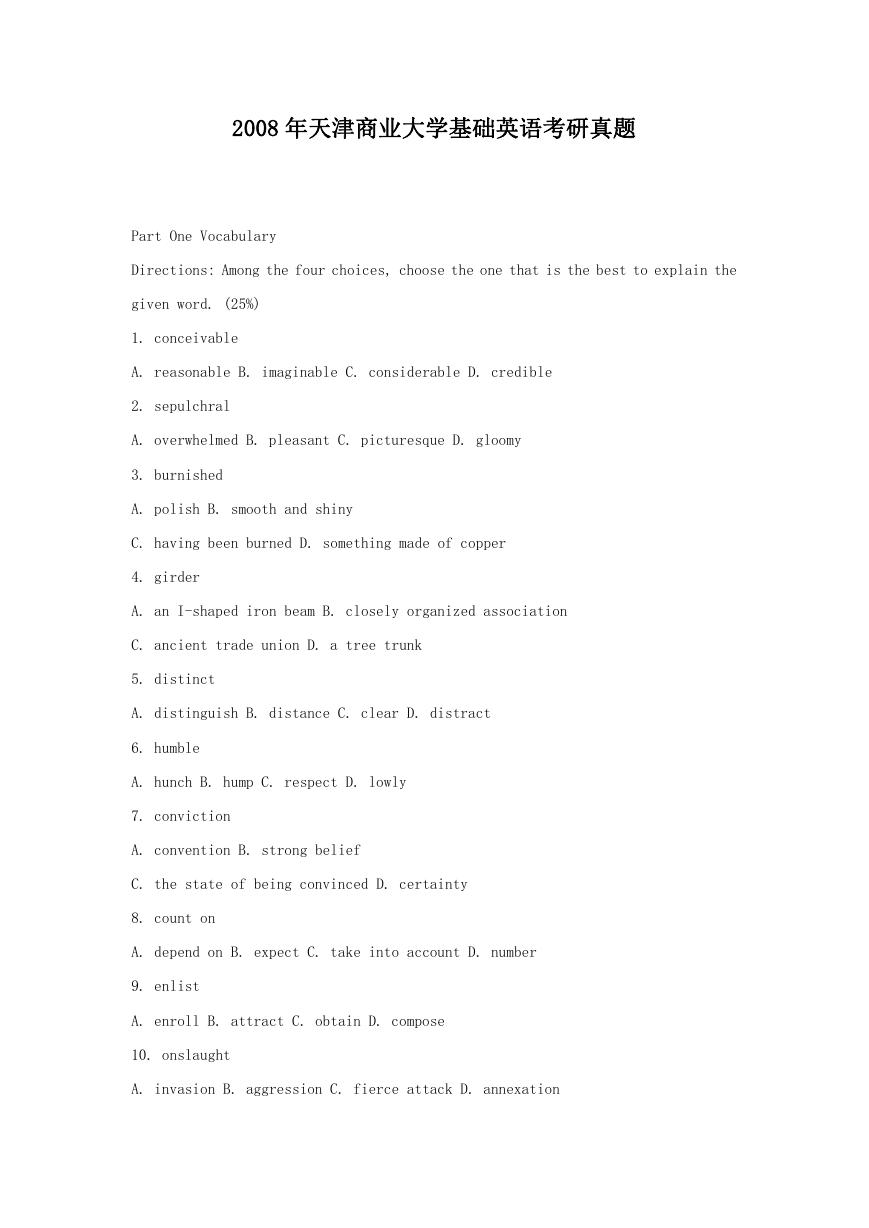
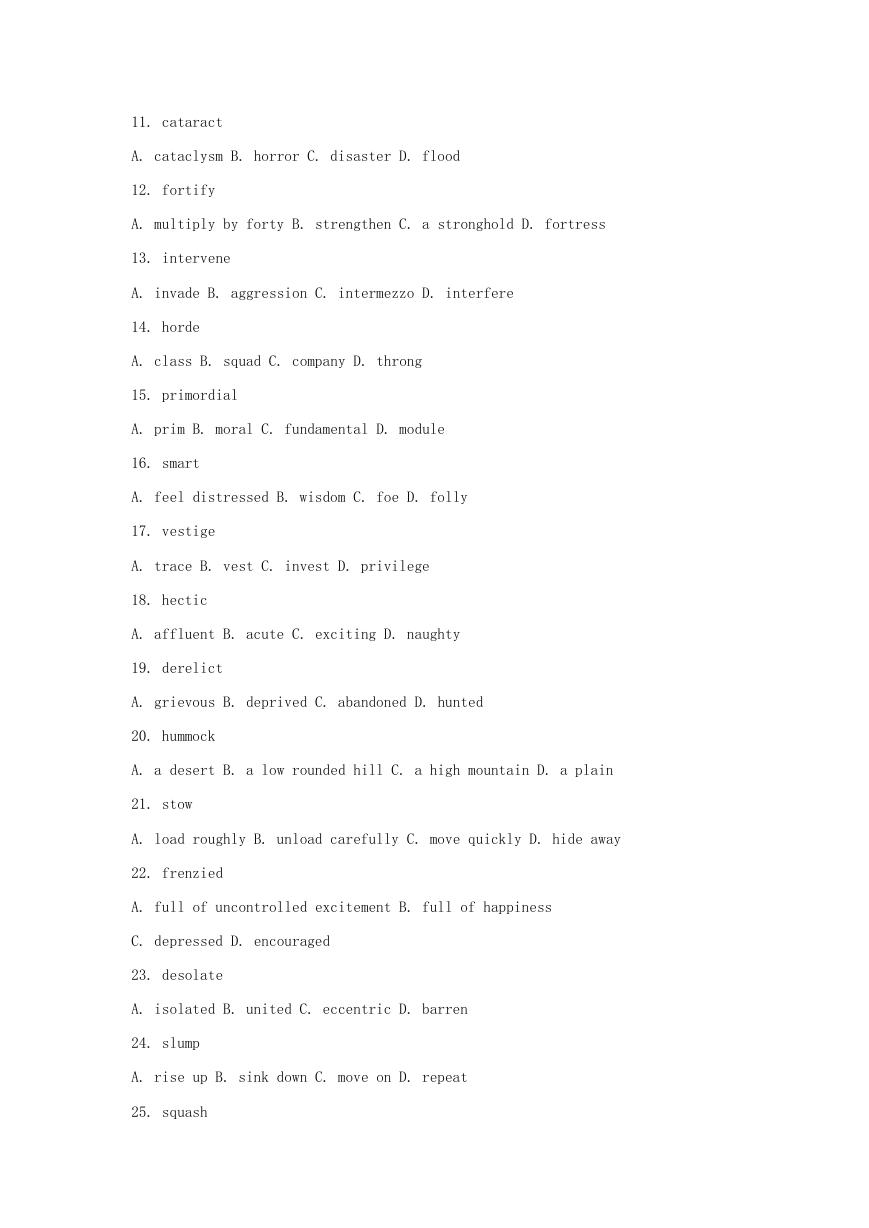
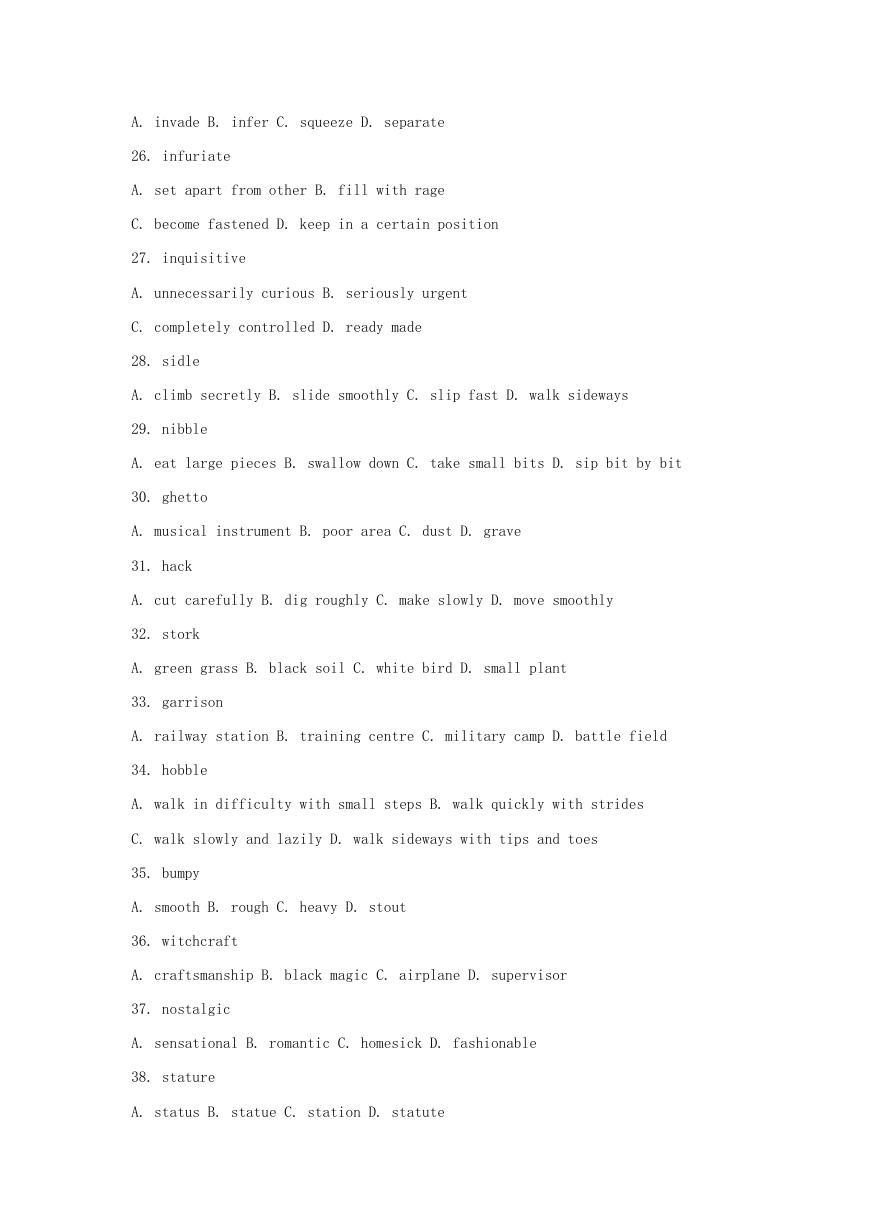
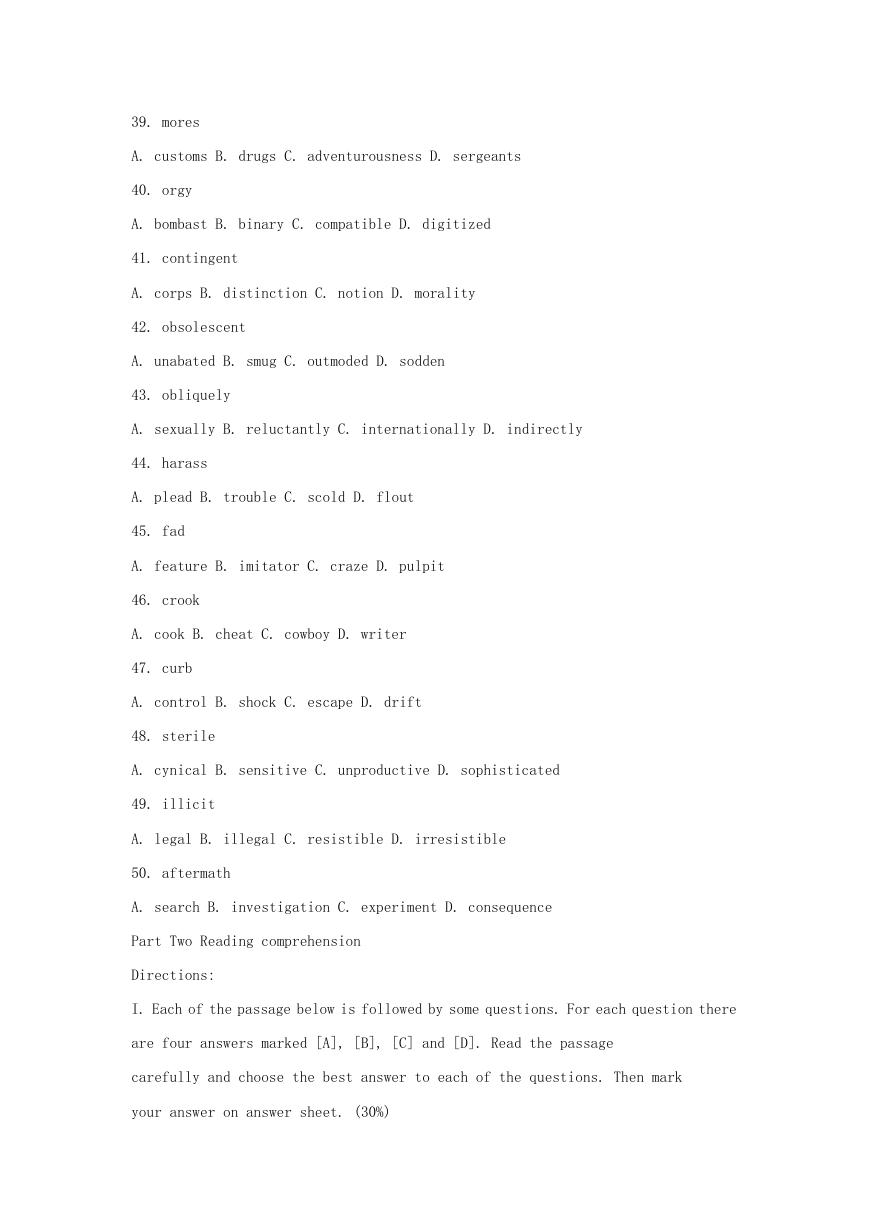

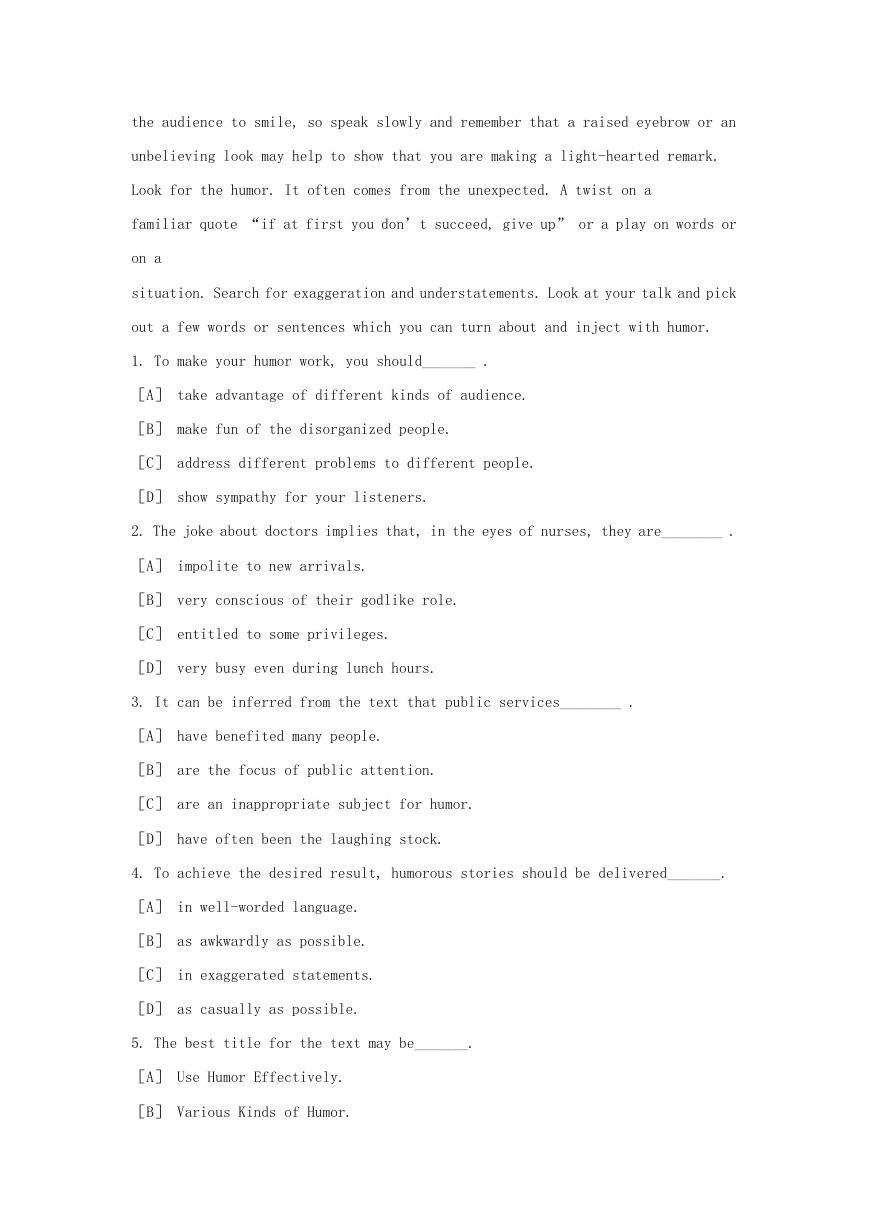

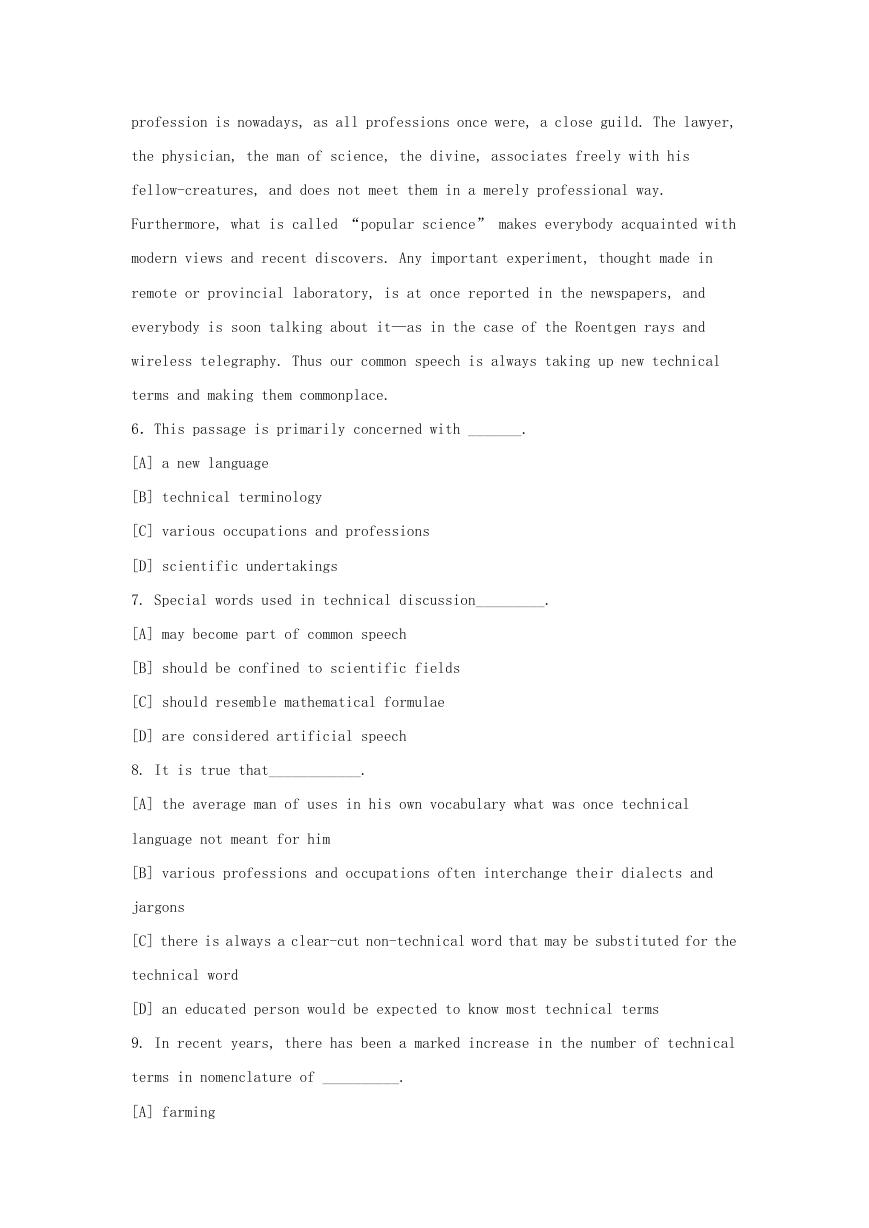








 2023年江西萍乡中考道德与法治真题及答案.doc
2023年江西萍乡中考道德与法治真题及答案.doc 2012年重庆南川中考生物真题及答案.doc
2012年重庆南川中考生物真题及答案.doc 2013年江西师范大学地理学综合及文艺理论基础考研真题.doc
2013年江西师范大学地理学综合及文艺理论基础考研真题.doc 2020年四川甘孜小升初语文真题及答案I卷.doc
2020年四川甘孜小升初语文真题及答案I卷.doc 2020年注册岩土工程师专业基础考试真题及答案.doc
2020年注册岩土工程师专业基础考试真题及答案.doc 2023-2024学年福建省厦门市九年级上学期数学月考试题及答案.doc
2023-2024学年福建省厦门市九年级上学期数学月考试题及答案.doc 2021-2022学年辽宁省沈阳市大东区九年级上学期语文期末试题及答案.doc
2021-2022学年辽宁省沈阳市大东区九年级上学期语文期末试题及答案.doc 2022-2023学年北京东城区初三第一学期物理期末试卷及答案.doc
2022-2023学年北京东城区初三第一学期物理期末试卷及答案.doc 2018上半年江西教师资格初中地理学科知识与教学能力真题及答案.doc
2018上半年江西教师资格初中地理学科知识与教学能力真题及答案.doc 2012年河北国家公务员申论考试真题及答案-省级.doc
2012年河北国家公务员申论考试真题及答案-省级.doc 2020-2021学年江苏省扬州市江都区邵樊片九年级上学期数学第一次质量检测试题及答案.doc
2020-2021学年江苏省扬州市江都区邵樊片九年级上学期数学第一次质量检测试题及答案.doc 2022下半年黑龙江教师资格证中学综合素质真题及答案.doc
2022下半年黑龙江教师资格证中学综合素质真题及答案.doc